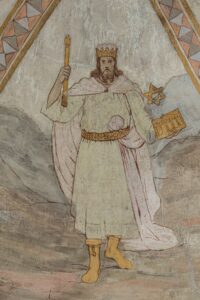
An instructive biblical example of how the Lord uses and governs providential events to accomplish His will in our lives is found in 1 Kings chapters 1 and 2.
Providential Care in Action
A repentant David believed that it was God’s will to make Solomon the next king of Israel, yet in these chapters we see a plotting Adonijah maneuvering to install himself as the next ruler. The aging and ill David had not yet made it clear to the nation which of his sons he endorsed to follow him as king. Perhaps he too feared Adonijah, his son, or he feared that the people would not accept a child of him and Bathsheba to sit on Israel’s holy throne. There was also the question of the Lord’s will in the matter, as an influential priest, Abiathar was endorsing one candidate, Adonijah, while a holy prophet, Nathan gave his support to Solomon.
David, however, had made it clear to Bathsheba, for 1 Kings 1:30 tells us that David had earlier – perhaps years before – sworn to her that he would make her son, Solomon, the next king.
David recalled this, saying to Bathsheba amid his final words, “Even as I swore unto thee by the LORD God of Israel, saying, Assuredly Solomon thy son shall reign after me, and he shall sit upon my throne in my stead” (1 Kings 1:30).
Natural arguments
In the vacuum of clear instructions to the nation, however, this other of David’s sons, Adonijah moved quickly to seize the reins of power. Adon-i-Jah’s name in the Hebrew means, Lord-my (is) Jeh.
2 Samuel 3:2-5 lists the sons of David born in Hebron, during his first seven years as king. It lists them in their birth order, and either each wife had one son, or the list gives us the eldest male from each wife: 1. Amnon son of Ahinoam; 2. Chileab of Abigail; 3. Absalom of Maacah; 4. Adonijah of Haggith; 5. Shephatiah of Abital; and 6. Ithream of Eglah. Solomon was born of Bathsheba in Jerusalem, and so was younger and after these six. We know that Amnon was slain by Absalom, and Absalom was slain in turn by Joab. We hear nothing of the others except for Adonijah, who being older than Solomon, apparently decided that he was next in line for the throne.
1 Kings 1:5-9 tells us that Adonijah was handsome, undisciplined and had managed to obtain the support of Joab, the leading general of the army and of Abiathar, an older and influential priest, both prominent figures in the government of David. It seems that these were assembled together with their supporters in what was to be an early victory celebration. These were already giving him the royal salutation, “God save king Adonijah” (vs. 25).
We can surmise some of Adonijah’s arguments. He was older than Solomon and thought himself next in line by seniority of birth. And how could the people approve of Solomon becoming king of this holy nation when Solomon was the son of David and Bathsheba?
We read in 1 Kings 1 that it is Nathan the Prophet who sparks the call to stop Adonijah and to make Solomon the next king. But why? Was it not Nathan the Prophet who years earlier rebuked in the Lord’s name David’s sin with Bathsheba?
God’s declaration

Yet, there is a decisively different factor, i.e.,
“. . . and she [Bathsheba] bare a son, and he called his name Solomon: and the LORD loved him. And he sent by the hand of Nathan the prophet; and he called his name Jedidiah, because of the LORD” (2 Samuel 12:24-25).
Solomon: When most people are asked what this name means they reply, “Wisdom.” While this is not a bad answer, as Solomon was known for his great wisdom given to him by the Lord, it is not correct. This name in Hebrew is Shalom-oh, literally, Shlom-o, Peace-his; i.e., “His peace.” The Lord’s merciful allowing this second child of David and Bathsheba to live was a proof that David’s repentance, marked by the penitential Psalm 51, was accepted and this child was a token of “God’s peace” with David, and thus aptly named, “His Peace,” Shalom-o (KJV, Solomon —“Peace-His”).
Note also that 2 Samuel 12:25 also names this child, Jedidiah, which in Hebrew means, Jedi – “delight, friend, beloved” of Jeh ( Jehovah), the Lord. Thus the David-Bathsheba matter, as far as the child Solomon goes, does not soil him. This child is both His-Peace and Beloved-of-the-Lord. If the Lord Himself, through his holy prophet, Nathan pronounces this child to be His friend and beloved, let no sinful human dare to charge him with any residual taint – He is loved by God! This truth is enunciated in Acts 10:15, “What God hath cleansed, call not thou common [unclean].”
Thus Nathan the Prophet – who previously had shown that his primary interest was in seeing God’s will done, now acts in favor of Solomon, showing us the wonderful truth that when God declares someone clean, he or she is clean indeed.
To make this crystal clear to all, God Himself through His prophet, Nathan, named this child, “Jedidiah,” “Beloved-of Jeh,” thus proclaiming to all that this child was both accepted by God and “beloved.” Thus Solomon was made king. This event rings true to every soul who accepts Christ and becomes a Christian; we not only are cleansed, but by God’s grace and mercy we are adopted into the family of God, “beloved,” and even privileged to serve Him. Thus His word declares, “But if we walk in the light, as he is in the light, we have fellowship one with another, and the blood of Jesus Christ his Son cleanseth us from all sin” (1 John 1:7).
Dr. Gary Cohen is an Adjunct Professor  at Trinity International University, Florida
at Trinity International University, Florida
For more stories on God, visit https://www.goodnewsfl.org/topic/god/

Comments